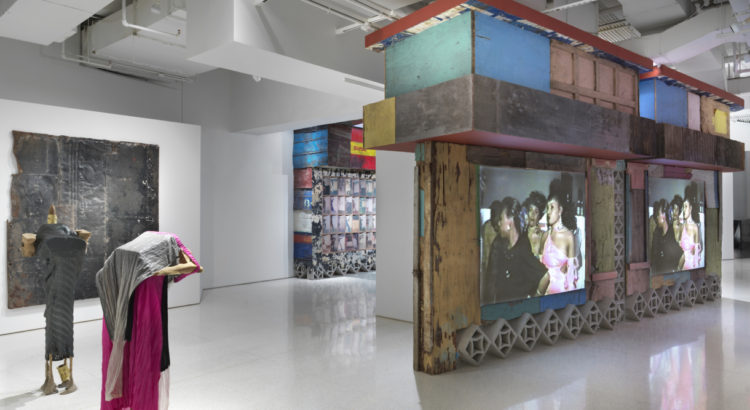Akeem Smith’s No Gyal Can Test exhibition at Red Bull Arts Detroit transgresses disciplinary classifications and the expectancy for a singular ethnographic history of dancehall, which is readily accessible to a globalized audience eager to exploit its cultural legacy.
In Jamaica, upper-class families grill their home to deter robberies of their houses. Smith utilizes these grills to protect the archival dancehall photographic and film footage behind, which ranges the two decades between the 80s and 2000s. Protruding from the flat walls of the building’s underground tombs, these decorative homes symbolize the artist’s attitude toward a global viewership that commodifies the hypervisible women of the movement. The voyeurim of the gallery visitor questions the assumed invitation to peer through cast iron metal shields. What is offered and what is withheld? On the other hand, their installation can also be perceived in relation to wealthy Jamaicans’ refusal to accept the cultural and political revolution of dancehall as a national signifier. Viewers are meant to question their position within, or outside of, the household in order to better understand what is deserving of safeguarding.
In these and other wall works, photographs and videos are intentionally obscured, offering a limited visual scope to the memories they document. Queens Street, an assembled building with an exposed interior, encases a single-channel video that plays abstracted and slowed-down footage of a dance. Because there is a gap between the welded metal doorway attached to the front of the house and the leftmost edge of the adjacent window, viewers are situated awkwardly outside this personal space peering indoors. The portrait included in Black Queen, a minimal and rectangular wall work made with salvaged, black building remnants, is hidden from view behind an top section of latticework. The woman’s face is almost entirely encased in its shadow.
Curated by Maxwell Wolf and Kenta Murakami, this unique expression of love culminates the preceding twelve years of archival work and outreach to honor the legacy of the dancehall community Smith grew up around in Kingston, Jamaica. Born in Brooklyn, NY and raised in the Waterhouse District in Kingston before returning to Crown Heights, Smith is the godson of Paula Ouch, the founder of the Ouch fashion house, an all women’s team that shaped the visual loudness of the era. Several of their garments on view are draped on mannequins sculpted by collaborative artist Jessi Reaves that commemorate the women of his youth and particularly Sandra Lee, the central fashion and hair stylist. Jewelry by Brando, his grandmother’s former partner, is juxtaposed alongside these original pieces. The interwoven nature of his life is further solidified through his grandma, who raised him alongside his mom, and co-owned La Roose club in Portmore, a coastal city that borders Kingston. Materials – corrugated zinc, tarp, repurposed wood, and breeze – from the building’s facade, as well as other disused social spaces, make up the main components of Smith’s deeply-personal installations.
While Smith’s process implements specific protocols to procure and ethically compensate Jamaicans who provided him with the exhibition material, the extension of these guidelines within the gallery are ultimately left to the discretion of the visitor. What is implicated through the exhibition’s free admission and allowance of photography that facilitates a capturing of images among visitors?
Akeem Smith: No Gyal Can Test is on view at Red Bull Arts Detroit in Eastern Market every Friday – Sunday from 12 pm – 7 pm until July 30. Reservations are required. Appointments to see the Soursop offsite installation at Woods Cathedral in Detroit can also be made using the same webpage: https://ngct.redbullarts.com
Artist Information:
Akeem Smith – Instagram: https://www.instagram.com/akeemouch/


